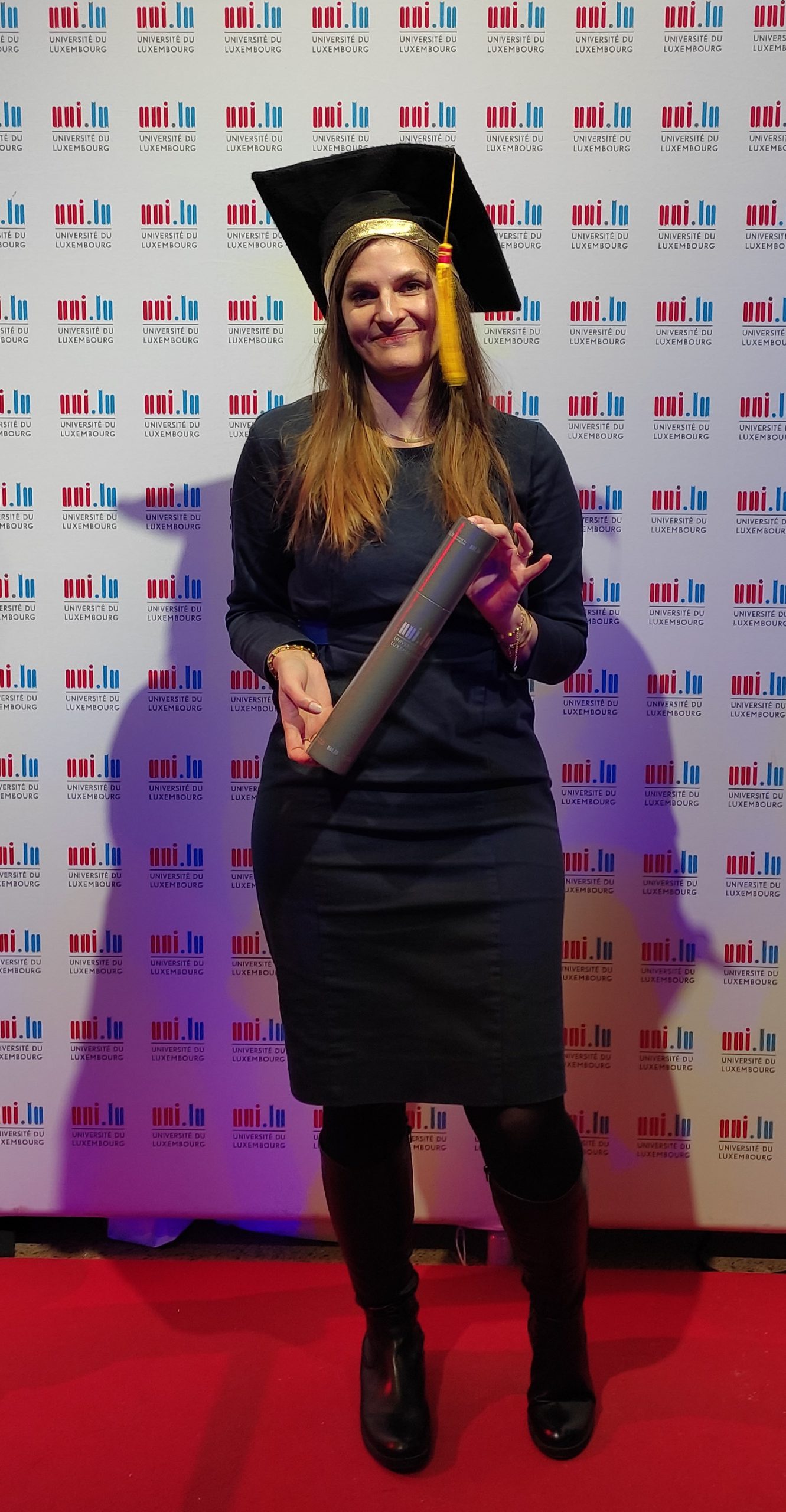Rebecca Czolk is an early career scientist who won the EATRIS Next Gen Scientist Silver Prize together with her fellow PhD students Bianca Brandus and Rafaëla Schober. Rebecca shared her experience with us both as an award winner and a member of EATRIS community. Check out the comic that won the prize at the bottom of the page.

Tell us a bit about yourself.
I am Rebecca, originally from Germany but I completed my PhD education at the University of Luxembourg (UL). Before starting my PhD journey, I did my masters in Germany in Biochemistry. Afterwards, I worked on an educational project at the University for Applied Science in Kaiserslautern, creating virtual laboratories for students. This was my first brush with science communication, finding creative ways to visualise chemical reactions happening invisibly within a test tube or explaining enzyme function in movie form.
I finished my PhD in Luxembourg with a great science communication experience under my belt and I was delighted to seize the opportunities offered by the Doctoral Education in Science Communication (DESCOM) team. Working on different projects with Nicole Paschek and the team has allowed me to explain scientific concepts to the broad public in different forms, but always in a fun and engaging way. I won the EATRIS Next Gen Scientist silver prize for a comic that I created as a part of this programme at UL.
How are you connected with EATRIS and what does a typical week look like for you?
I did my PhD at the Luxembourg Institute of Health (LIH), which is one of EATRIS member institutions, working together towards better translational medicine applications. A typical working week in the group of Translational Allergology, headed by Dr Annette Kuehn, starts with a department meeting on Mondays, allowing us to present our research progress in front of our peers. The rest of the week is a mix of lab work, data analysis, which is my main focus and meetings discussing projects and progress with my Principal Investigator (PI) or collaboration partners. Essential to my working week are my lunch breaks, where I eat with my ‘work wife’ and my friend group, discuss anything but the job and have a little walk around the block with a sweet mint tea afterwards.
Tell us more about your work, which received the EATRIS Next Gen Scientist Silver Prize.
An unimaginable number of bacteria inhabit this world and our bodies. Most of them are friendly and even necessary to our health. They help us digest our food and protect our skin. However, bacteria can also cause severe disease and infection. Luckily, a lab mishap almost 100 years ago led to the development of antibiotics, powerful medications that can destroy harmful bacteria. Since then, the overuse of these medications has led bacteria to develop mechanisms to evade this killing (antimicrobial resistance or AMR for short), creating untreatable infections. Luckily, each one of us can help to prevent the spread of AMR. This is why together with my fellow PhD students Bianca Brandus and Rafaëla Schober, we created a fun educational comic “Keeping up with the bacteria” as part of the science comic LUX:plorations Vol 2. This comic was produced in 5 languages and explains the problem of AMR and how you can be part of the solution in only 2 pages.
Image: Rebecca receiving her PhD thesis.
What is translational research for you?
For me, translational research is transforming scientific knowledge into tangible solutions that directly benefit the patient. It is about applying lab discoveries to real-world applications, ensuring that our research efforts result in meaningful advancements in healthcare, technology, and beyond. It is a crucial step in making sure that the fruits of scientific inquiry are not just confined to academic journals, but rather have a meaningful impact on improving people’s lives.
Why did you decide to work in the translational medicine field?
While basic research is the foundation of understanding health and disease, I was always drawn to a more applied approach, seeing how my research could directly benefit a patient or a population in the future. Already during my Master’s studies, I worked on a refined treatment approach for glioblastoma, a brain tumour with a very poor prognosis. Seeing that we could enhance treatment effects with our approach, was very satisfying, even if it was only in a mouse model at that point.
What advice would you give your younger self?
‘Do it your way and it will turn out great!’ My career and life path was not always a straight one, quite the opposite, but following my gut and doing it my way always turned out well in the end.
What do you like to do when you aren’t working?
When the weather allows it, I like to be outside, hiking or biking. I love modern art and animals (with a special soft spot for dinosaurs), so I often visit art exhibitions, animal parks or natural history museums. I travel a lot and am always on the hunt for the next vacation destination.
If you were a drug, vaccine or diagnostic, what would you be and why?
I would love to be a vaccine. Prevention is the best medicine and I would actively help prevent deadly diseases from spreading. This would also help global efforts to eradicate illnesses like smallpox, protect communities, promote public health, and offer a cost-effective solution to healthcare everywhere. My special focus would be to reduce the disease burden in lower-income countries.
Read the comic below or download here.

















